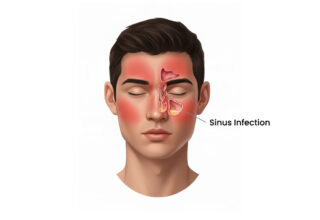Many of us have felt that uncomfortable burning sensation in our stomachs at some point— maybe after skipping meals, taking painkillers too often, or having a big or a greasy meal. But when that discomfort turns into something more persistent, it could be a sign of stomach ulcer.
In this blog, let’s learn what stomach ulcers are, their common symptoms and causes, and how they can be treated.
What is a Stomach Ulcer?
Stomach ulcer also known as gastric ulcer is an open sore that forms in the lining of your stomach and can cause anything from mild discomfort to a sharp, burning, and nagging stomach pain.
Stomach ulcers develop when the protective layer of mucus that shields your stomach from digestive acids becomes damaged. Without this barrier, the stomach acid can damage your stomach lining, leading to irritation, inflammation, and eventually formation of an ulcer.
Stomach ulcers are common and usually treatable, but if they’re left untreated, they can lead to serious complications.
Common Symptoms of Stomach Ulcers:
Stomach ulcers can vary widely in symptoms. Some people don’t even realise they have one until it gets worse, while others feel the burning pain that won’t go away.
The most common signs and symptoms include:
- A burning or gnawing pain in center of your tummy (abdomen)
- Indigestion
- Heartburn and acid reflux
- Bloating or feeling full quickly
- Nausea
- Vomiting
- Unintended weight loss
- Dark or tarry stools (a sign of bleeding in the stomach)
- Vomiting blood or material that looks like coffee ground (in more serious cases)
Some people may not have any symptoms until complications arise. That’s why it’s important to pay attention to persistent stomach discomfort.
Causes of Stomach Ulcers:
About 80 to 90% of stomach ulcers are caused by one of the following:
1. Helicobacter Pylori (H. pylori Infection):
pylori is a spiral shaped bacterium that grows in the digestive tract and can damage the protective lining of your stomach. It can cause ulcers in the stomach (gastric ulcer) or in the duodenum (duodenal ulcer).
Many people have H. pylori infection and is usually harmless, but in some cases it leads to ulcers. It is not fully understood why some people are more affected than others.
2. Overuse of Non Steroidal Anti-inflammatory Drugs (NSAIDs):
NSAIDs are widely used medicines to usually treat pain, fever, and inflammation.
Overuse of these medicines, especially for a long period of time can also cause stomach ulcers.
Some commonly used NSAIDs include:
- Ibuprofen
- Aspirin
- Naproxen
- Diclofenac
It was once believed that stress or certain foods were to blame for stomach ulcers, but there’s a little scientific evidence to support that idea.
There are some factors that can make your symptoms worse if you already have a stomach ulcer:
- Smoking (may increase your risk of developing stomach ulcer)
- Alcohol
- Spicy and acidic foods
- Stress
- Certain medical conditions like Zollinger-Ellison Syndrome
How are Stomach Ulcers Diagnosed?
If your doctor suspects stomach ulcer, they might suggest one or more of the following:
- Blood, stool, or breath test to check for H. pylori
- Gastroscopy (a test in which a thin flexible tube with a camera is passed through the mouth into the stomach to look directly for ulcers)
Treatment of Stomach Ulcers:
The good news is that most stomach ulcers heal once the underlying cause is treated.
If your ulcers are caused by the NSAIDs use, simply stopping these medicines may be enough to heal your ulcers.
However if the ulcer is caused by bacterial infection like H. pylori, you’ll likely need a course of antibiotics to clear the infection.
Your doctor may also prescribe medications to reduce stomach acid and protect the lining of your stomach while it heals.
Common treatments used to treat many people include:
- Antibiotics like amoxicillin, clarithromycin, and metronidazole, to kill H.pylori, if it’s present.
- Proton Pump Inhibitors (PPIs) eg, omeprazole and esomeprazole, to reduce stomach acid and help the ulcer to heal.
- H2 receptor blockers like famotidine and cimetidine, to lower stomach acid by blocking acid production.
- Cytoprotective agents like sucralfate and bismuth subsalicylate, to help coat the stomach lining and protect it while healing.
If an ulcer causes bleeding or forms a hole in the stomach wall, your doctor might need to treat it directly during a gastroscopy. They can stop the bleeding by sealing the area or injecting medication.
In rare cases, surgery might be needed— especially if the ulcer doesn’t heal with medication, keeps coming back, or blocks food from leaving your stomach due to scarring.
Prevention:
Here are some steps that you can take to lower your risk of developing stomach ulcers:
- Limit or avoid the use of NSAIDs. If you have to take them, use as directed by your healthcare provider
- Wash your hands regularly to avoid H. pylori exposure
- Avoid other irritants like smoking and alcohol
Complications of Stomach Ulcers:
Many stomach ulcers heal with proper treatment. However, ignoring them and leaving them untreated can lead to serious complications like:
- Bleeding ulcer
- Perforation (a hole in the stomach wall)
- Obstruction or blockage in the digestive tract due to swelling of inflamed tissues
- Penetration (ulcers goes through the wall of GI tract into another organ)
When to See a Doctor?
Don’t ignore persistent stomach pain, especially if it gets worse over time or is accompanied with other serious symptoms. Contact your doctor immediately if you:
- Are passing black, sticky, tarry stools
- Are having sudden sharp abdominal pain
According to the NHS, get immediate medical help by going to your nearest A&E department or calling 999 If:
- You’re vomiting blood— it may look bright red or may have a dark brown, grainy appearance like that of coffee grounds.
It can be a sign of serious complications like internal bleeding.
Final Thoughts:
Stomach ulcers are more common than many people realise. But with the proper care and treatment, they can be healed. Listen to your body and don’t ignore any signs it gives you. And if you feel something isn’t fine, don’t hesitate to check with your doctor.








